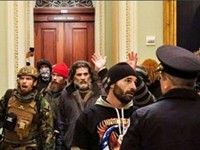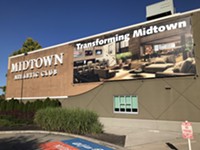[
{
"name": "500x250 Ad",
"insertPoint": "5",
"component": "15667920",
"parentWrapperClass": "",
"requiredCountToDisplay": "1"
}
]
"Once again we've seen an outrageous attempt to terrorize innocent civilians. This is an attack not just on Paris, it's an attack not just on the people of France, but this is an attack on all of humanity and the universal values that we share." -President Obama, November 13.
I love Paris. I was there last Christmas. The weather was mild spring weather for us Rochesterians. The city was all lit up, festive, alive. On our first day in Paris, my husband and I attended Sunday Mass at Notre Dame de Paris, then joined our kids for dinner at a Lebanese restaurant, owned by an Iranian, where we had delicious makanek and manouche.
Every day, the Eiffel Tower would begin to shimmer at dusk, and we'd head to the Christmas market along the Champs-Elysées. There's nothing like churros and a hot drink on a cold winter night. Children would be ice-skating in a small, makeshift rink with plenty of cheerful music to induce a camel spin or two.
Our kids wanted to take a look at the elusive Mona Lisa, so we did that, as well as partake of the ostentatious gold at the Chateau de Versailles. But my favorite place continues to be Montmartre. The Sacré-Coeur is always magical and the views from the hill stunning. We met some friends at a restaurant and felt perfectly happy and at home.
Yet after the Paris attacks on November 13 and the facile discourse in mainstream media, I have to ask myself: Why is Paris the city of love and lights rather than the capital of the brutal French Empire? Why do Parisians represent humanity more than the Lebanese whose lives were extinguished in suicide attacks the day before?
Why are French values better than Turkish values? An equally horrible bombing in Ankara, just a month earlier, targeted Turkish lives and values, after all.
I am reminded of Rachid Ouaissa's perspicuous essay "Frantz Fanon: The Empowerment of the Periphery," in which he talks about how "the so-called globalization, with its new forms of domination and exploitation under the auspices of the IMF and World Bank as well as the speculative economy, drives masses towards a kind of chronic marginality, promoting the emergence of violent peripheries."
In the same way, and even more dramatically, war transfers chaos and violence from the center, the fortified First World, to Third World hinterlands. It's nothing new. The Bush doctrine aimed for this kind of transference in clear, concise words: the need to fight them over there, so we don't have to face them here.
Before adopting the mind-numbing language of "us vs. them," it's essential to go back to Fanon and his apt analysis that "Europe is literally the creation of the Third World." Indeed, let's try and imagine France without Algeria, or the British Empire without India, or Belgium without the Congo, or the United States without genocide and slavery. The Global North exists as it is now because of the Global South and what it is now. Their histories, psychologies, and present-day realities are deeply imbricated and cannot be so easily untangled.
Unfortunately, rather than acknowledge, unknot, and begin to resolve some of the complexities of these centuries-old power hierarchies and the damage they continue to inflict, we prefer to bury our heads deeper in the sand and talk in childish binaries of good and evil or the clash of civilizations.
Whenever systemic violence, which created and sustains the current world order, spills into the First World, it is received with incredible shock and outrage. Why are we not cognizant of similar atrocities happening on a daily basis in Afghanistan, Iraq, Syria, Yemen, or Somalia - places that we invade, occupy, drone, and decimate without a second thought?
Why is the solution to any act of aggression, the reflexive bombing of civilians on the periphery, usually described in the aggregate as a "war zone" or "ISIS headquarters"? And why is this kind of generic revenge accepted, if not embraced, by all - this mind-blowing logic of bombing Syria as a solution to every problem and then refusing to shelter Syrian refugees fleeing the war?
I am Pakistani-American, and I am unceasingly stunned by the reactions I see on social media, where well-meaning Pakistani citizens ask questions like "What do you expect France to do? Rain flowers?" This detachment of France from its past and present imperial exertions, this divorcement of violence from power and empire, this split between the center and the periphery, is all the more problematic when it's parroted by the Global South.
Yet in a way it makes perfect sense. The Third World too has its centers and peripheries. When a small group of Taliban forced their way into a school and massacred children in the Pakistani city of Peshawar in 2014, the process of mourning this incomprehensible horror became laced with bloodthirsty vengeance.
My social media newsfeed was flooded with images of lynched men. "Terror suspects must be hanged within 24 hours," perfectly nice people declared. A Pakistani woman, holding a toddler in her profile picture, urged the Pakistani army to "kill them all, kill their neighbors, kill their friends, kill anyone who gives them bread, kill anyone who offers them shelter...." She went on for an entire paragraph. In Pakistan, too, it is okay to sacrifice the indigent, voiceless, faceless people on the periphery, in North Waziristan, in order to ensure safety for the privileged center.
And so it is with the killing of young black men in America, whom a militarized police force must "contain" to make life safer/whiter on the right side of the tracks.
I recently completed a documentary film about the partition of India in 1947. A few days ago, right after the Paris attacks, I was thinking about the parallels between the partition and what happened in Palestine in 1947-48. One overwhelming similarity was that both events are unquestionably embedded in colonialism.
I was reading about the Arab uprising against the Ottoman Empire in 1916, how it was strongly encouraged by the British, but after the war was won, the Arab people were not granted independence. On the contrary, the Sykes-Picot agreement was signed secretly, and the Middle East was divided into British and French spheres of influence. I couldn't help but think of another, much more recent Arab uprising which was crushed by harsher dictatorships, military interventions, perpetual civil strife, and proxy wars.
As Michel Foucault would say, the past is never dead. It continues to haunt us, control us, define us. We must use it to understand our present but most importantly, most urgently, to come up with a better world.
Mara Ahmed has lived and been educated in Belgium, Pakistan and the US. An artist and filmmaker, her third documentary "A Thin Wall," about the Partition of India in 1947, premiered at the Little Theatre in April 2015 and was subsequently screened in Bradford (UK), Seattle, Vancouver, Palo Alto, and Berkeley. She lives in Pittsford with her two children and husband.
Mary Anna Towler's Urban Journal is on break; it'll return next week.
Speaking of Paris Terrorist Attacks, terrorism
-

Rochester man faces federal charges in U.S. Capitol rioting
Jan 15, 2021 -

Trump's Riyadh speech and the roots of terrorism
May 31, 2017 -

Trump’s fact-free nation and democracy’s future
Feb 28, 2017 - More »





